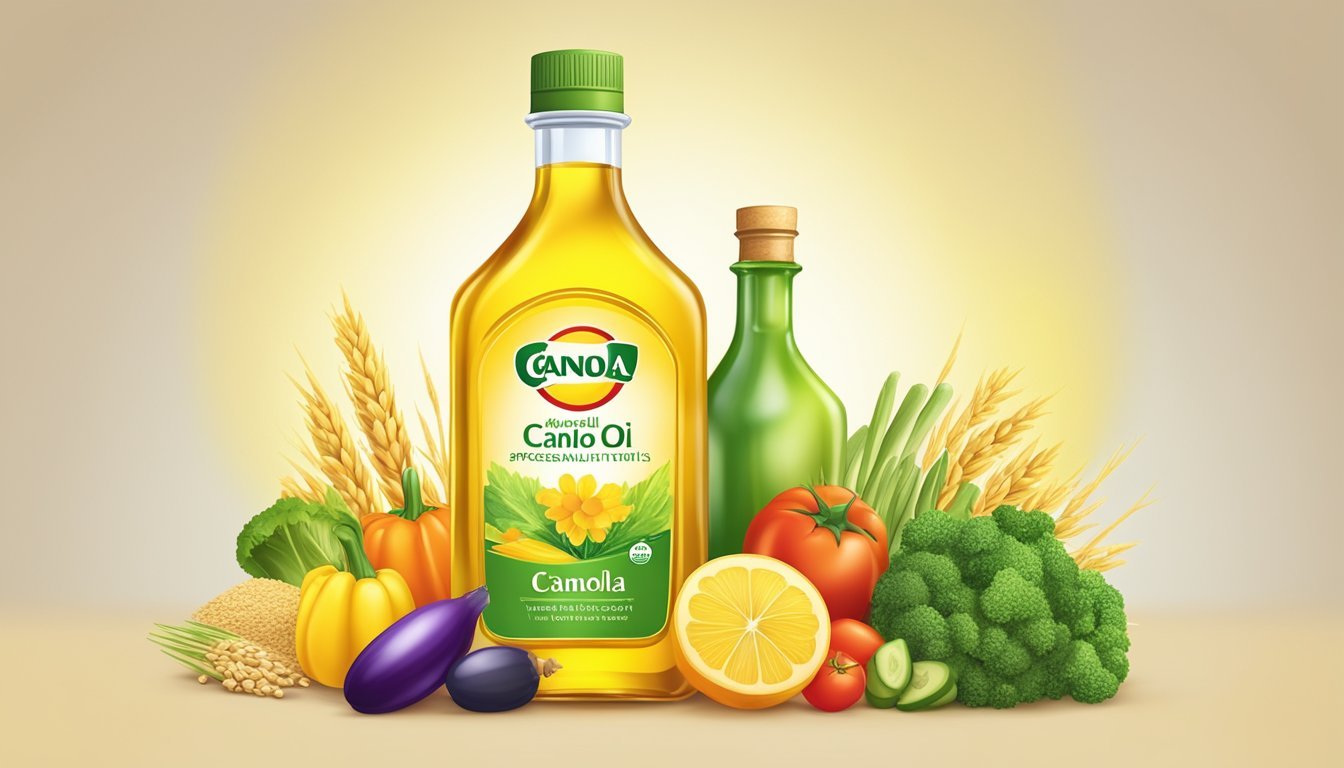What Are the Health Benefits of Canola Oil?
Unveiling Nutritional Advantages
Canola oil is a widely used cooking oil derived from the crushed seeds of the canola plant, which belongs to the Brassica family that includes broccoli, brussels sprouts, and mustard. This oil has garnered attention for its potential health benefits primarily due to its nutrient composition. It is particularly rich in monounsaturated fats, which are known to support heart health, and also provides a source of essential fatty acids such as omega-3 and omega-6, which the human body cannot produce on its own.
The nutritional profile of canola oil includes significant amounts of vitamins E and K. Vitamin E functions as an antioxidant in the body, helping to protect cells from damage caused by free radicals, whereas vitamin K is essential for blood clotting and bone health. With a relatively low percentage of saturated fats compared to other cooking oils, canola oil is considered favorable for maintaining healthy cholesterol levels. Its balanced ratio of omega fatty acids is thought to contribute to a healthy lipid profile, which can be beneficial for cardiovascular health.
In addition to its heart-healthy fats, canola oil contains plant sterols, which are compounds that can help lower cholesterol absorption in the digestive system. As such, it is often viewed as a heart-friendly choice for cooking and food preparation. As dietary habits shift toward healthier options, canola oil remains a subject of interest for its place in a balanced diet and its potential to support overall well-being.
Nutritional Profile of Canola Oil
Canola oil boasts a balanced fatty acid composition and is rich in essential vitamins and antioxidants, rendering it a nutritious option for various culinary applications.
Fatty Acid Composition
Canola oil is predominately composed of unsaturated fats, which are considered to be heart-healthy. Specifically, it contains high levels of monounsaturated fat and a significant amount of polyunsaturated fat, including both omega-3 and omega-6 fatty acids. The presence of these fats contributes to a favorable balance that can support heart health.
Monounsaturated fat: Helps maintain healthy cholesterol levels.
Polyunsaturated fat: Includes essential fatty acids like alpha-linolenic acid (omega-3) and linoleic acid (omega-6), both important for body functions.
Saturated fat: Present in lower amounts compared to other fats, which is favorable for maintaining a healthy diet.
The typical fatty acid breakdown of canola oil is:
Saturated fatty acids: 7%
Monounsaturated fatty acids (MUFA): 63%
Polyunsaturated fatty acids (PUFA):
Omega-6 fatty acids: 19%
Omega-3 fatty acids (alpha-linolenic acid): 11%
Vitamins and Antioxidants
Canola oil is a good source of vitamin E and vitamin K, both of which play vital roles in the body. Vitamin E acts as an antioxidant, helping to protect cells from damage caused by free radicals. Vitamin K is essential for blood clotting and bone health.
Vitamin E: Around 16% of the Daily Value (DV) per serving.
Vitamin K: Provides approximately 8% of the DV per serving.
The antioxidant properties of the vitamins in canola oil contribute to its health benefits and its stability as a cooking oil, making it a versatile addition to one's diet.
Health Impact of Canola Oil
Canola oil, recognized for its nutritional profile, is linked to several health benefits, particularly pertaining to heart health, inflammation reduction, and cognitive function.
Heart Health
Canola oil is a source of mono- and polyunsaturated fatty acids, including omega-3 (alpha-linolenic acid, ALA) and omega-6 fatty acids. These unsaturated fats are beneficial for heart health as they can lower low-density lipoprotein (LDL) cholesterol levels, commonly referred to as 'bad' cholesterol. Regular consumption of canola oil may lead to a reduced risk of coronary heart disease due to its potential to improve blood lipid profiles.
Cholesterol: A diet including canola oil might lower total and LDL cholesterol.
Blood Pressure: Unsaturated fats in canola oil can also contribute to maintaining healthy blood pressure levels.
Reducing Inflammation and Disease Risk
The balance of omega-6 and omega-3 fatty acids in canola oil is considered favorable for potentially reducing inflammatory markers. Chronic inflammation is a known risk factor for several health conditions, including obesity, diabetes, and metabolic syndrome. Additionally, the anti-inflammatory properties of the omega fatty acids in canola oil may help manage these conditions and reduce the overall disease risk.
Inflammatory Diseases: A diet enriched with canola oil might improve inflammatory responses, which are implicated in diseases like diabetes and obesity.
Cognitive Function
Canola oil contains ALA, which is a precursor to eicosapentaenoic acid (EPA) and docosahexaenoic acid (DHA)—fatty acids crucial for brain health. While the conversion rate of ALA to EPA and DHA is low, a moderate intake of ALA from canola oil may still support cognitive functions and could be linked to a lower risk of neurological conditions, such as Alzheimer’s disease.
Brain Health: Fatty acids from canola oil could contribute to the maintenance of brain structure and function.
Canola Oil in Cooking and Food Preparation
Canola oil is known for its versatility and neutral flavor, making it a preferred choice for various cooking methods. It has a high smoke point and a balanced composition of fat, suitable for diverse culinary applications.
Cooking Performance
Canola oil boasts a high smoke point, approximately 400°F (204°C), which is higher than many other cooking oils, making it ideal for frying and other high-heat cooking methods. Its high smoke point ensures that it does not break down or oxidize easily at high temperatures, retaining its nutritional quality during cooking.
Smoke Points of Various Oils:
Canola Oil: 400°F (204°C)
Olive Oil: 375°F (191°C)
Butter: 302°F (150°C)
Coconut Oil: 350°F (177°C)
Avocado Oil: 520°F (271°C)
Vegetable Oil: 400-450°F (204-232°C)
Due to its neutral flavor, canola oil does not overpower the taste of food, making it a good medium for cooking that allows the natural flavors of ingredients to shine through.
Comparison with Other Oils
When it comes to fat composition, canola oil is predominantly comprised of monounsaturated fats, with a significant amount of polyunsaturated fats, which are considered heart-healthy options.
Fat Composition Comparison:
Canola Oil: High in monounsaturated fats, low in saturated fats
Olive Oil: High in monounsaturated fats, low in saturated fats
Butter: High in saturated fats
Coconut Oil: High in saturated fats
Avocado Oil: High in monounsaturated fats, low in saturated fats
Vegetable Oil: Varied fat composition depending on the blend
In contrast to olive oil, which is often favored for its flavor in dressings and low-heat cooking, canola oil's subtle taste and high heat tolerance make it a more suitable option for frying and baking. Comparatively, coconut and avocado oils have higher amounts of saturated fats and distinct flavors that may not be as versatile in cooking. Butter, while rich in flavor, contains a higher proportion of saturated fats and has a lower smoke point, which limits its use in high-temperature cooking.
Canola oil stands out for its healthful fats and high smoke point, which allow it to be used in a broader range of cooking techniques compared to other oils like butter, coconut oil, olive oil, and some vegetable oils.
Frequently Asked Questions
In this section, we address common inquiries regarding the health implications of canola oil, its nutritional profile, and its comparison to other oils, as well as exploring its uses and potential concerns.
What are the potential health effects of consuming canola oil?
Canola oil is rich in unsaturated fats, which are crucial for the body's absorption of fat-soluble vitamins and for providing energy. Its high content of monounsaturated fats, particularly omega-9, is associated with heart health benefits.
How does canola oil compare to olive oil in terms of health benefits?
While both oils offer heart-healthy monounsaturated fats, olive oil has a well-established reputation for its health benefits, particularly extra virgin olive oil, which is less processed. Canola oil, however, typically has a lower saturated fat content compared to olive oil and is also less expensive, making it a cost-effective alternative.
What are the nutritional components of canola oil?
Canola oil provides calories and is a good source of vitamins E and K. It also contains a balance of omega-3 and omega-6 fatty acids, which are essential for health but should be consumed in a proper balance to prevent potential inflammation.
Can the use of canola oil in cooking contribute to inflammation in the body?
While canola oil does contain omega-6 fatty acids, which in excess can be pro-inflammatory, it also has a significant amount of omega-3s, which are anti-inflammatory. Moderation and a balanced diet are key to preventing inflammation.
What are the most common uses of canola oil in terms of health and nutrition?
Canola oil is commonly used in cooking and baking due to its mild flavor and high smoke point. Its unsaturated fat content makes it a healthier choice for heart health, and it can be used as a staple for a variety of culinary applications.
Are there any adverse effects associated with the consumption of canola oil?
While moderate consumption of canola oil is generally considered safe, excessive intake of any oil, including canola, could lead to negative health effects such as increased calorie consumption and potential weight gain. Some individuals may also have concerns regarding genetically modified canola plants, although current research has not conclusively proven adverse health effects from genetically modified foods.



